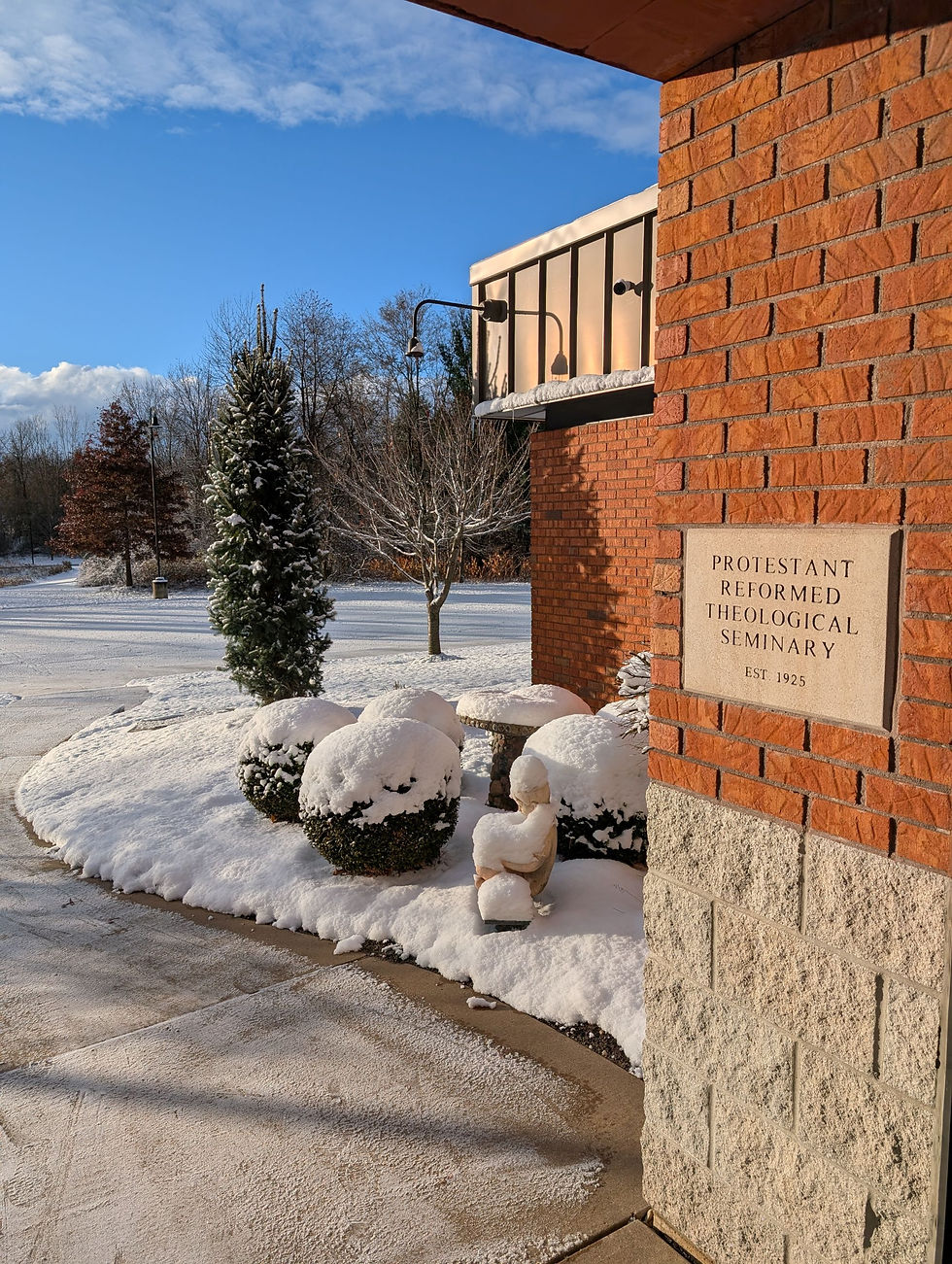Spring 2025 Issue of PR Theological Journal Now Available!
- prcseminary1925
- Apr 23, 2025
- 4 min read

The faculty of the Protestant Reformed Theological Seminary has produced the Spring (April) 2025 issue of their journal. And it is truly a special one. Dedicated to the doctrinal foundation of the Protestant Reformed Churches in America (PRCA) and her seminary in 1925, the latest issue exposes the serious errors of the doctrine of common grace as adopted by the Christian Reformed (CRC) Synod in 1924.
The articles in this spring issue not only retell the history of the controversy that gave birth to the PRCA but also reveal what serious consequences this error of common grace had for the CRC--and now for contemporary Reformed and Evangelical churches. In doing so, they call the PRCA to stand firm in the truths of God's sovereign, particular, saving grace in Jesus Christ--the very heart of the gospel!
In this post we introduce you to the contents of PRTJ 58.2 by referencing Prof. D. Kuiper's editor's notes. After reading them, you will want to dive into the issue! The digital file has been posted on the journal page of the PRTS website. Print copies are being mailed out to those on our mailing list. If you wish to be added to that list, contact the seminary, or stop in and pick one up.
"Does God show a saving grace to His elect, based on Christ’s atoning death, and a non-saving grace to every human? Do some who receive grace in this life go to hell after this life? And is the preaching of the gospel an instance of non-saving grace, as God expresses a favor to those who hear but refuse to believe?
"Many theologians in the Christian Reformed Church in North America (CRC) in the early 1920s answered affirmatively. They asserted that Scripture and the Reformed confessions provided the basis for this positive answer, and that Reformed theologians from the time of Calvin to the present taught a common grace.
"Not all CRC pastors agreed. This set the stage for the CRC Synod of Kalamazoo 1924. That synod met just over one hundred years ago. When it defended the affirmative answer to the above questions, several CRC churches in west Michigan formally expressed their intent to appeal its decision. This formal agreement was made at a meeting on March 6, 1925. A good argument could be made that March 6, 1925, is the birthday of the Protestant Reformed Churches in America.
*****
"Centennials ought to be observed. To observe the centennial of the CRC Synod 1924 and the response of the PRCA’s fathers to it, the faculty of the Protestant Reformed Theological School gave five speeches on October 31-November 2, 2024. The speeches are reproduced here in written form. Some of the articles, in fact, retain the flavor and style of the spoken word.
"The first is a historical overview of the synod and the context in which it met. The history is not new. The article presents new material in three ways. First, it puts the synod in its cultural context. Second, it includes newspaper reporting in its sources. Third, it provides as complete a rendition of Herman Hoeksema’s speech on the floor of the synod as is possible today.
"The second responds to the idea of common grace generally. Prof. Brian Huizinga shows the doctrine to be wrong confessionally, scripturally, and practically. One takeaway is this: the Psalms are so prominent and forceful in teaching that God does not love the impenitent, unbelieving wicked. The doctrine of common grace developed after the Reformation and was codified in 1924. It would not have been developed in Israel during David’s day.
"The third addresses the well-meant offer of the gospel (WMO). Prof. Ronald Cammenga clearly explains what the WMO is and demonstrates that the WMO view of the preaching of the gospel was not that of Jesus or Paul and does not accord with God’s revealed purposes for the declaration of the gospel. Cammenga does not base this demonstration on a few, or even ten, passages; he demonstrates that it is the pervasive teaching of Scripture.
"The synod incorporated Abraham Kuyper’s doctrine of common grace into its second and third points. Prof. Barry Gritters interacts with the second point, which taught that God restrains sin in the hearts of unbelievers. Today’s neo-Calvinism, he argues, is driven by the teachings of that second point. In the CRC particularly, that second point has resulted in a paradigm shift.
"The third point of common grace regards the ability of unregenerate humans to do civil good. Prof. Cory Griess responds with exegetical and confessional arguments and points out the doctrine’s ill effects. It boils down to this: regardless of how we earthlings define “good,” how does God define it?
"Reading these articles, one cannot help but come to three conclusions. First, not the doctrine of common grace, but the opposition to it and the defense of sovereign, particular grace in Jesus Christ, is based on a fair reading of Scripture and the Reformed confessions.
"Second, the doctrine of common grace as developed in 1924 was no flash in the pan. That synod was a decisive moment in the history of the CRC.
"Finally, the PRCA’s response a century later is motivated, not by a desire to justify our existence, nor by an intellectual interest in our history, but by our desire to teach truth. Because of this, to revisit the issue is timely."




Comments